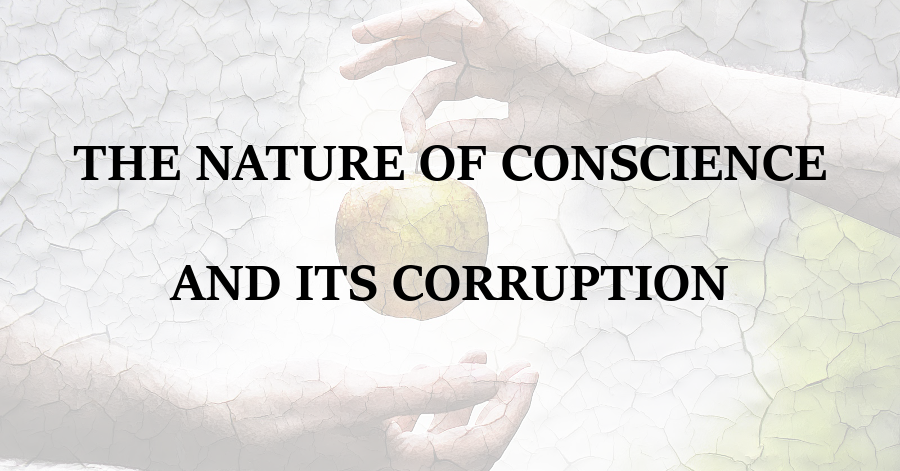 Anthony Burgess
Anthony BurgessTreatise on Original Sin
Part 3, chapter 2, section 1.
“But even their mind, and conscience is defiled.”
(Titus 1:15).
Hitherto we have been discovering original sin as seated in the understanding, the metropolis (as it were) of the soul. We now proceed to manifest it as polluting the conscience of every man by nature; and certainly this is more lamentable and dreadful than the former. For if the understanding be amongst the other powers of the soul, as gold amongst other metals, conscience is the pearl or diamond in that gold. If the understanding be the eye of the soul, conscience is the apple of the eye. Who would not think that our conscience had escaped in the Fall of Adam? Like Job’s messenger bringing us tidings of all the spiritual loss we had thereby, that only the conscience was not hurt? But this text will inform us that from the head to the sole of the feet (as it were) there is no place free, but that we are totum vulnus [all wounded], so many Lazarus’s, not one place without these spiritual ulcers.
For the understanding of the text, we may take notice that Titus exercising his ministerial office now at Crete (whether as a settled officer and Metropolitan, which some highly contend for, or rather as a temporary and extraordinary officer, an Evangelist, is not here to be disputed). Paul writeth this Epistle to him concerning his end, why he left him there, and also exciteth him to a lively performance of his office, especially in a sharp and severe rebuking of the Cretians, because of their doting still about Jewish fables and ceremonies. And to evidence the crime of the Cretians the more, he brings a testimony from Epimenides, whom he calls their prophet by way of conception, for they esteemed him so, sacrificing to him, for he pretended in furious fits to be like one acted with a divine spirit and rapture. Now this famous brand he stigmatizeth the Cretians with, that they were always liars, etc. And although Epimenides, being a Cretian, it might be retorted that he lied in saying the Cretians were liars, yet the speech is to be understood not of everyone, but of the general part, and therefore the Apostle saith “this witness is true” (Titus 1:13); From whence Aquinas gathereth that wheresoever there is any truth, a Doctor in the Church may make his use of it, because all truth is of God.
The use here is not so much for confirmation, as conviction. If you ask, why must these Cretians be so sharply rebuked for their doctrine about Jewish ceremonies, seeing Romans 14 the Apostle doth prescribe another deportment to such of forbearance and condescension? The answer is, those that are there spoken of were such as did err out of infirmity and weakness, but these in Crete were such as did obstinately and pertinaciously defend these false doctrines; therefore, they must be severely dealt with, yet the end of this censure is medicinal, that they may be sound in the faith. All error is a sickness and a disease.
The Apostle having thus informed about Titus his duty, he proceedeth to some doctrinal instruction about those erroneous opinions, instancing in one, which was greatly controverted in the infancy of the Church, and that is about the choice of meats and abstinence from them. To obviate any corrupt doctrine herein, he layeth down this weighty proposition: “Unto the pure all things are pure” (Titus 1:15), that is, to such who are sanctified by the Christian saith and are rightly instructed in Christian liberty, all things of this kind (not adultery, fornication, or such sins) are pure to them and they may lawfully use them. Every creature as the Apostle elsewhere, being sanctified by the Word of God and prayer. This truth he amplifieth by the contrary proposition, “but unto the defiled and unbelieving, nothing is pure,” this is more than if he had said, “All things are unclean,” for that might have been limited, as in the former, to things of this kind, but saying that nothing is pure to them is signified hereby, that all is pitch (as it were) that the touch. That like a Leper, even good things do not purify them, but they defile them. And then you have the cause and fountain of this: “Even their mind and conscience is defiled.” No wonder the streams are polluted, when the fountains are. By “mind” is meant the speculative part of our understanding, by “conscience,” the practical part; and therefore having spoken of the pollution of the former, we now proceed to the later.
The Pollution of the ConscienceThis text is deservedly brought by Protestant authors to prove that all the actions of unregenerate persons, and much more of infidels, are altogether sin, that there is not one truly good action to be found amongst them because the mind and conscience is thus all over polluted. The Popish interpreters, because they are for the negative, yea some going so far as to plead for the salvation of infidels, though without the knowledge of Christ, do limit the text too much, as if it were only to be understood of those whose minds were not informed with true knowledge, nor their consciences rightly guided in those disputes about Jewish ceremonies, as if to such only all things were unclean. But although these persons gave the occasion, yet the Apostle maketh an universal proposition, and therefore he doth not only say “the defiled,” but also “the unbelieving,” which comprehends all those that have no true knowledge of Christ. And the reason is univocally belonging to everyone, for every man’s mind and conscience without faith is polluted and cannot please God.
The fountain thus cleared, this stream of doctrine floweth from it: that the consciences of all men by nature are polluted and defiled. “Even their mind and conscience” signifying by that expression that there remaineth no hope (as it were) for them when the foundations are thus removed.
This defiled conscience in Scripture is the opposite of a good conscience (1 Peter 3:16), a pure or clean conscience (1 Tim. 3:9), and that by the blood of Christ (Heb. 9:14; Heb. 13:18; Acts 24:16). Only those that are regenerate have this kind of conscience. But an evil conscience is “defiled” as here in the text, “dead” (Heb. 9:14), “seared” (1 Tim. 4:2). There is also a weak conscience that the godly may have. The conscience we are to treat upon is the defiled one, and that not so much as made more impure and sinful by voluntary impieties, as what it is by nature in everyone.
The Nature of the ConscienceAnd before we come to demonstrate the pollution of it, it is good to take notice of the nature of it. The New Testament useth the word συνείδησις about thirty times for conscience. Most commonly that which in the New Testament is called conscience, in the Old is called leb, “the heart of a man.” So, David’s heart is said to smite him, apponere ad cor, and redire and cor are nothing but the acts of conscience, and thus sometimes in the New Testament, “If our heart condemns us” (1 John 3:20). It’s observed that the first signification of the word leb, is a conspersion, or meal sprinkled with water. Thus, the heart of a man is a lump (as it were) watered and sprinkled with some common principles and apprehensions about God, and what is good and evil. As for the nature of conscience itself, it is not good to be too nice in scholastic disputes about it, remembering that of Bernard, there was Multum scientiae, but param conscientiae in the world.
Is Conscience a Faculty, Habit, or an Act?It’s disputed whether conscience is a power, a habit, or an act only. That it is not a power Aquinas proveth because that can never be removed, or laid aside, or changed, whereas conscience may. Some say therefore it’s a habit, others, as Aquinas and Dr. Ames, answering Mr. Perkins’ objection, “why it cannot be an act, that it is an act?” [Of Conscience and the Cases Thereof]. But certainly, as scientia [knowledge] is sometimes taken for that which is by way of a principle or habit in man, and sometimes for that which is by way of act, so also it is with conscience, it taketh into its nature both that practical habit (called by Aristotle intellectus, or the habit of first principles) and also the actual application of them. For if conscience were not habitual, as well as an act, there would be no conscience in men when they are asleep, which yet cannot be denied unto regenerate persons. As in Scripture, faith and love are taken sometimes for the habit of those graces, sometimes for the acts of them, so also conscience is taken both for the principle and the act itself.
For to the acting of conscience there is required (as all observe) a practical syllogism: “Whosoever is a fornicator, a drunkard, a curser, cannot inherit the kingdom of God: But I am such a sinner: Therefore I cannot inherit the kingdom of God.” Or on the contrary: “To him that believeth and is of a broken contrite heart, pardon of sin is promised: But I believe and am of a broken heart: Therefore, to me pardon of sin is promised.” Thus, conscience is well called the practical understanding, for whereas the speculative hath for its object that which is merely true, this looketh upon it as ordainable to action, as such a truth is to be brought into application. To every acting then of conscience completely, there is required a syllogism, either interpretative or formal. And as Dr. Ames saith well,
Conscience in the Major Proposition is Lex, in the Assumption it is Testis, in the Conclusion it is Judex. In the first Proposition, there it is by way of a Law, dictating such a thing to be true; In the Minor it is a Witness, bearing witness either against or for ourselves; And lastly, it is a Judge passing sentence according to the premises.
And in that it is called conscience it doth relate to another, a knowledge with another, that is either ourselves; so that conscience in its actions is conceived as a person, as it were, distinct from us, and so that witnesseth with our hearts, what we are and what we have done. Hence if a man’s conscience lay a sin to his charge, though all the world free him, yet he beareth guilt and terror about with him, Quid proderit tibi non habere conscium habenti conscientiam, or else, which is more probable, it is called “con-science,” or “knowledge with,” in respect of God. In the actions of conscience there is a sense and apprehension of the knowledge of God and his presence. Therefore conscience doth always bear some aspect to God, this God will see, this God will punish, this God hath forbidden, and therefore let me betimes take heed how I do it. So that while conscience hath any stirrings and vigorous actions there is some hope in a man. Although it be thus generally received by all that conscience belongs to the understanding, yet Durand makes it something probable (Lib. 2. Distinct. 39. Quast. 4), “That if it be not the will, yet the will is necessarily included in the workings of conscience, so that conscience doth denote understanding and will also.” For that act of conscience which is called remordere, to bite and sting a man, to make him grieve and be sad upon the committing of sin, must flow from the will.
Conscience Not Entirely Lost After the FallSecondly, although man hath lost the Image of God, and be thus all over polluted, yet he hath not lost neither his soul nor the faculties thereof with some inbred principles both speculative and practical (which can no more be separated from the soul, than the beams from the Sun). Hence that habit of practical principles, such as that there is a God, that he is to be worshipped, that Parents are to be honored, is called à conservando, because these are kept and preserved still, or rather as Martinius in his Lexicon out of Hierom, because these do instigate and incline to keep us from sin in our actions. The Schoolmen commonly call it Synderesis, and say it is as much as con electio, but this is because of their ignorance of the Greek tongue. These relics of God’s Image are lost in us still, even as after some great fire of a stately palace there remain some sparks long after; or in the demolishing of glorious towns, there will some rudera, some remnants appear of such a building.
It is true, this is questioned by some. Illyricus out of his vehement desire to aggravate sin, denieth there is any sense or knowledge of a God left in a man more than in a brute, and endeavoureth to answer those places of Scripture which are brought to prove those common principles, or implanted knowledge in a man by nature. The Socinians also, (though plowing with another heifer) do deny any implanted knowledge by God, but that it comes by tradition. On the other side Pelagians, Arminians, and some Papists fall into another extreme, for they hold such principles about God and what is good, that they may be light enough to guide us to salvation. It is not my work now to examine either of these, for the truth is between these two.
There are some implanted practical notions in us about God and what is good, against those that err in the defect, and yet they are in no way able to conduct to eternal happiness, against those that err in the excess. To prove this will be to anticipate myself in the protract of this discourse about original sin. Therefore, here only we take it for granted, that there are such principles, as also a conscience to discern between good and evil, which though it be greatly polluted, yet this “candle of the Lord, searching the inward things of a man” (Prov. 20:27), is not quite extinct. Whether these common principles are naturally propagated as the body is, (as the Lutherans say, who hold the Traduction of souls from parents) or, whether they are De Novo created in the creation of the soul, as the dissentient party from that opinion must hold, is not here to be debated, we may conclude that the soul hath a natural testimony in itself about God, and therefore in sudden calamities doth immediately cry out to him, which made Tertullian say, “O anima naturaliter Christiana!“
We Must Not Go Against ConscienceThirdly, because conscience doth thus witness with God, and as it were, in God’s stead, it hath such a command and power over a man that we must not go against conscience. We may go against our wills, against our affections, but we must not go against our consciences. No, not when they are erroneous, and though they dictate sin, “Whatsoever is not of faith is sin” (Rom. 14:23), and he that doubteth is condemned. Conscience is but an inferior Judge, God and the Scripture are superior to it, so that when conscience prescribeth anything, and we come to know it is against God’s Word, then we are to reject it as the inferior Magistrate’s command is made void when the superior doth countermand. But while the practical dictate of conscience doth abide, and we know not that God doth forbid it, then we must not go against it. Because it witnesseth to our apprehension with God, and therefore to go against it, though it may not be materially a sin, because in an error, and in a delusion, yet formally it is, because we contemn God and his authority over us. The very Heathen could say conscience is a God to every man. It is true, that Atheistic writer (lib de Cive), as he doth most profanely determine, “that it is a seditious opinion, to hold faith and holiness are supernaturally infused and inspired; so also, to hold that to discern between good and bad, just and unjust, is a duty belonging to the conscience of private men in what they are to act.” What is this, but to teach men Atheism by art and precepts? As Logic and Philosophy are taught, and doth it not condemn the whole doctrine of the Gospel as being incompatible with obedience to Magistrates.
Seeing then that conscience is thus left in a man with so great power and authority, seeing by it that good is to be done and sin avoided, the pollution of it will be the more dreadful and lamentable. What hope is there of man’s power to convert himself to God when the conscience is thus wasted by sin? If the watchman be blind, if the witness be dumb, if the judge be corrupted, how can any saving reformation be upon us? If the salt be unsavory, which is to season other things, what is it good for but to be cast away? This shipwreck of a good conscience, which all made in Adam, will undo us forever if grace doth not interpose.
Advertisements Share this:




